Actualizing Equity Event Series

2024 Event Series
Actualizing Equity requires more than simply passing policies. It demands processes that engage, support and build the capacity of our communities — and are deeply accountable to our input. It requires outcomes that are tailored to meet the needs of impacted people, not give rationale to the form and functions of inequitable systems. Join us as we explore how organizers and advocates are disrupting these entrenched patterns in government and community spaces to actualize equity in their work. Stay tuned for upcoming events!

Actualizing Equity through Coalition Organizing
Friday, March 8 | 11am to 12:30pm | Rondo Community Library
No single organization has the capacity to create the level of systems and policy change necessary to deliver racial justice to our communities. But coming together and collaborating with other aligned and trusted organizations has resulted in major policy and organizing wins. Building, maintaining, and working in coalitions, across different cultural communities, geographies, and levels of access to resources and power, however, requires great thoughtfulness, heart, and intentionality. What principles and strategies have been key to the successes of coalitions in the Twin Cities — and what common challenges remain barriers in our collective work? Join us as we use the recently released “Coalition Organizing Principles” from the Alliance as a jumping off point to discuss these critical questions together.
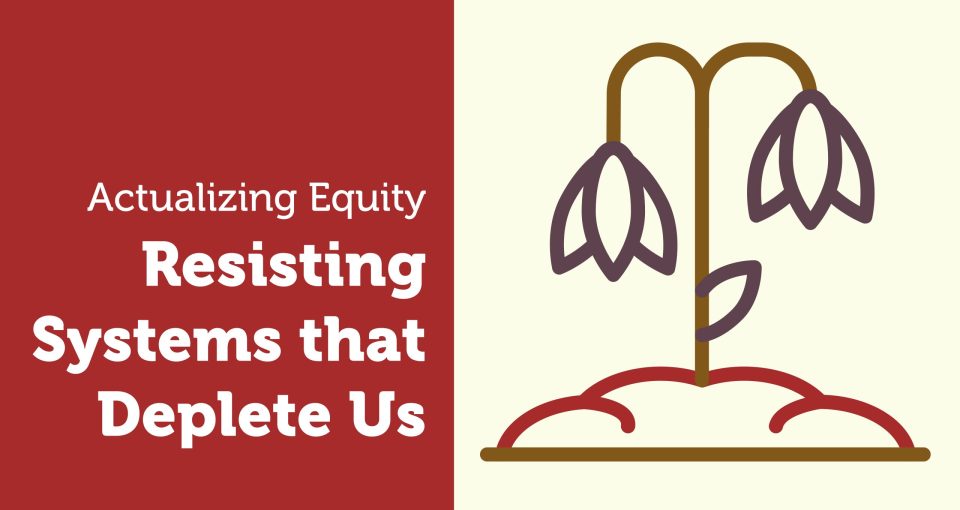
Actualizing Equity by Resisting Systems That Deplete Us
Friday, April 26 | 11am to 12:30pm | North Regional Library + Zoom
To achieve our collective visions for justice and liberation in our communities we must center the voices and experiences of those most impacted — but we cannot lose sight of our own wellbeing. Across sectors but especially in nonprofits, burnout has become an epidemic, draining our bodies and hollowing out our movements as leaders struggle to sustain themselves in the crush of processes that dehumanize and divide us.
How are organizations pushing back on entrenched systems insistent on incremental change? How are we metabolizing the daily trauma and exploitation we face working to advance policy change in spaces designed to undermine us? What tangible steps are we taking to redirect our energies and protect our spirits against burnout?
Join us for a conversation on this critical topic at our next Actualizing Equity discussion.

Actualizing Equity:
Integrating Anti-Displacement into Transit Evaluation
Friday, July 12 | 11am to 12:30pm | Online
From housing to transportation, many community development projects led by government agencies include community engagement to ostensibly integrate the insights of those most impacted. But, too often, these “public” processes are highly technical and challenging for community members to understand, let alone respond to in ways that have real and meaningful impact on the project. This month, with the release of a pivotal Environmental Impact Statement for the Blue Line Extension project, organizers are gearing up for a concerted campaign that creates new pathways for community members to have their voices heard and codifies anti-displacement as a core transit expense and impact.
Join members of the Blue Line Coalition at our next Actualizing Equity event to learn more about innovative steps they’re taking to make public processes more equitable and change the way the impacts of transit projects are calculated.
2023 Event Series

Actualizing Equity in Small Business and Economic Development
Friday, Feb 24 | 1:30 to 3 p.m. | Zoom
BIPOC businesses continue to play a vital role in culture, wealth building and economic wellbeing of BIPOC and immigrant communities, in addition to the region as a whole. In this event, we explored: What does it look like for BIPOC businesses to thrive on their own terms and how is it done? What tools do BIPOC businesses need to build and grow thriving businesses in Minnesota? How do BIPOC businesses prepare to withstand the next disaster? And how can BIPOC businesses benefit from landscape altering infrastructure projects?
Our panel of BIPOC entrepreneurs and advocates shared their insight around restructuring the ecosystem intended to support our businesses.
Actualizing Equity in Transit: A Vision of Abundance
Friday, April 28 | 11am to 12:30pm | Zoom
Historically in the Twin Cities, transit development has led to the systemic displacement of and under-investment in Black, Immigrant and local community members and businesses.
Blue Line Coalition is advocating for transformative shifts in transit development by leading with an abundance mindset. We know that community has the abundance of expertise to know the solutions for a successful transit line and corridor, and there is an abundance of resources to realize those solutions.
At the April Actualizing Equity event, the Blue Line Coalition will discuss: What elements compose such a vibrant community? And what it would take to materialize the collective outcomes our communities seek?
Convened by The Alliance, the Blue Line Coalition is rooted in the BIPOC and immigrant communities that will be most impacted by the Blue Line Light Rail Extension project. Since 2013, we have been working together to make sure government leaders recognize the Blue Line extension is a racial justice and regional equity issue and that community inclusion and leadership must be central to ALL planning and outcomes.
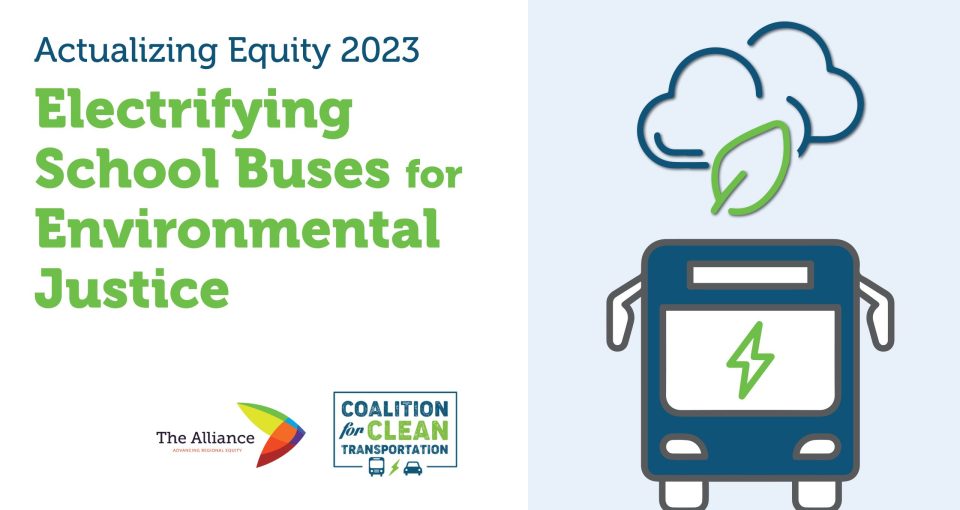 Actualizing Equity: Electric School Buses for Environmental Justice
Actualizing Equity: Electric School Buses for Environmental Justice
Friday, June 30 | 12-1 pm | Zoom
Every weekday, the emissions from diesel school buses threaten the health of hundreds of thousands of Minnesota’s K-12 students and drive up harmful air pollution in BIPOC communities. Right now, kids living in North Minneapolis and East Phillips — predominantly BIPOC neighborhoods — experience asthma hospitalizations at five times the rates of Minnesotans across the state, making clean electric school buses a clear environmental justice issue.
This legislative session, the Alliance-convened Coalition for Clean Transportation worked with directly impacted community members, health professionals and advocates to pass significant funding to electrify more school bus fleets and prioritize school districts in communities already facing environmental justice impacts and disparities. At this event, we heard from organizers and community leaders about the potential impacts of electric buses and how we move this campaign forward together!

Actualizing Equity in Housing: Building a Movement for Tenant & Community Ownership
Wednesday, August 30 | 11am-12:30 pm | Zoom
To achieve housing justice, we must uproot the policies that have made our homes a source of profit for corporations rather than assets for our families and communities. Minneapolis is part of a nationwide movement toward tenant and community ownership of our housing but what are the steps we have to take to get there? In recent years, the Housing Justice League has pushed for a Tenant Opportunity to Purchase policy in Minneapolis but entrenched interests and divided political will have blocked progress.
Join us for this Actualizing Equity session to hear about the lessons learned from the TOPA campaign thus far and how organizers are advancing the next stage of this critical work for housing equity in Minneapolis — and beyond!

Actualizing Equity through Placekeeping & Cultural Corridors
Friday, October 27 | 11am-12:30 pm | Zoom
Place and culture are intimately linked. From locally owned businesses to gathering places for the arts, the physical spaces in our communities make up the fabric of our lives. They signal who is included in our vision of thriving and what we collectively value and invest in. For years, BIPOC-led organizations have been elevating cultural corridors and “placekeeping” as tools for anti-displacement and equitable development — and, from Brooklyn Park to East St. Paul, the movement is growing in the Twin Cities. What are the lessons learned from the past decade and where are the innovations happening right now? Join us for a conversation with organizers and advocates leading this work on the ground!
2022 Event Series
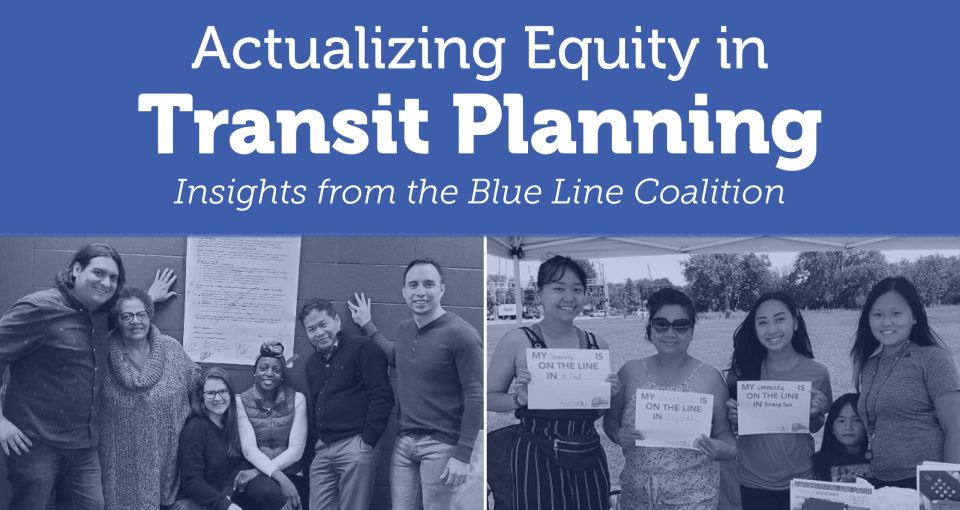
Actualizing Equity in Transit: Insights from the Blue Line Coalition
Friday, January 28, 2022 | 11 a.m. to 12:30 p.m. | Zoom
For many neighborhoods, light rail lines in St. Paul and Minneapolis — and across the country — have played a concerning role in pushing out low-wealth residents, immigrants and communities of color from their homes and businesses. For nearly a decade, the Blue Line Coalition has been working to integrate community voice into the planning process and create a different outcome for the Bottineau Corridor light rail extension project from Minneapolis to Brooklyn Park. As the project moves into critical decision-making stages, join members of the BLC to hear about their work and their new Community Report.
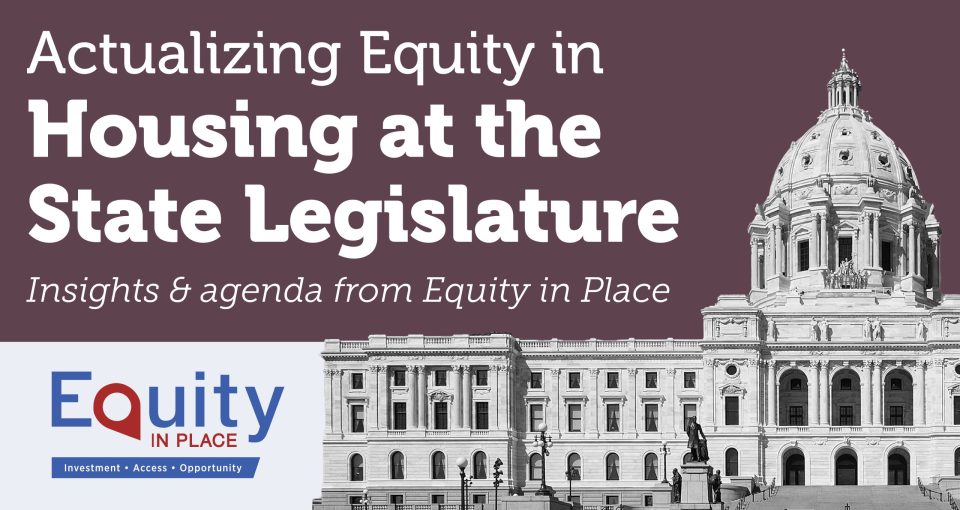
Actualizing Equity in Housing at the State Legislature
Friday, February 25, 2022 | 12:30-2 p.m. | Zoom
For generations, an epidemic of housing injustice has targeted communities of color, but the COVID pandemic and resulting statewide eviction moratorium have created broader public attention and targeted policy-making at all levels of government to protect the life and dignity of our neighbors who do not own their homes. Recognizing the critical role of state legislators and leaders in not just mitigating the harm of this pandemic moment but uprooting entrenched inequities for long term systemic change, Equity in Place has identified key priorities for housing policy during the current 2022 legislative session. Join leaders from EIP partner organizations to learn more about the need for and impact of these policies, as well as the narrative shifts we must center to drive transformative change.
Equity in Place is a diverse group of strategic partners from organizations led by people of color and housing advocacy organizations working to advance housing justice and equitable community development. Convened by the Alliance, we organize and advocate by leading with a race equity lens to understand and center how power inequities in our region and society shape inequitable outcomes for our communities.

Actualizing Equity in Community Engagement
Friday, April 29, 2022 | 11am-12:30 p.m. | Zoom
The COVID pandemic has caused massive shifts in the way we organize and advocate for systems and policy change. To protect our collective health while meeting the urgency of the moment, we had to adjust our strategies and tactics to mobilize our communities and bring both new and long-standing demands to institutions of power. Across issue areas and geographies, the unrelenting uncertainty and peril has taken a toll on our bodies, spirits and relationships — and also made space for new ideas that can make our movements more creative, inclusive and accessible.
As we continue to navigate the ongoing pandemic, what challenges have we faced and what opportunities have we embraced? Join us for a conversation with organizers who will share their insights, experiences and ideas.

Actualizing Equity: Narrative Shifts for Powerful Movements
Friday, June 24, 2022 | 11am-12:30 p.m. | Zoom
Shaping narratives is an essential aspect of community organizing to disrupt and uproot ingrained systems of oppression. By framing and communicating about our campaigns in strategic and intentional ways, we can more effectively mobilize our communities and engage policymakers to co-create the vision and advance the components of a fundamentally more just world. How are organizers across the Twin Cities integrating powerful messaging in their work? At our June 2022 Actualizing Equity event, local leaders joined us to explore narrative shifts that are advancing regional equity!
Speakers included:
- Ashley Fairbanks, Creative Director, 100% Campaign
- Corenia Smith, former campaign manager for Yes for Minneapolis
- Eleonore Wesserle, Senior Capacity Builder, We Make the Future
- Mari Ojeda, Senior Policy Associate, Energy Access and Equity, Fresh Energy
- Sebastian Rivera, artist organizer

Actualizing Equity in Climate and Environmental Justice
Friday, Sept 30, 2022 | 11am-12:30 p.m. | Zoom
While the Inflation Reduction Act will unleash historic federal funding to reduce CO2 emissions, it has sparked critical discussions about its lack of intentionality in centering frontline communities, environmental justice and reparations in addressing climate change and advancing clean energy. How are organizers in the Twin Cities responding to this latest legislation — and ensuring the most historically and systemically harmed communities are prioritized in their work? Join us for a conversation with local leaders!
2021 Event Series

Advancing Equity in the 2021 Legislative Session
Friday, January 22, 2020 | 11 a.m. to 12:30 p.m. | Zoom
From the eviction moratorium to business relief, 2020 made even more clear the critical role state leaders play in funding and policy decisions that directly impact the health, wealth and sustainability of our communities. As the 2021 state legislative session begins, join us for a conversation with leaders who are working to advance equity agendas related to housing stability, economic development, transportation and climate justice.
Watch video clips from the event on our YouTube channel
Download the recap highlighting Alliance member and partner legislative agendas for 2021
Friday, March 26, 11am to 12:30pm on Zoom
From the freeway through Rondo to the absence of reliable transit in the northwest suburbs, generations of transportation investments have bulldozed or bypassed communities of color. But coalition organizing has put equity at the forefront of major transportation projects in the Twin Cities that will have a significant impact on providing mobility access and economic opportunity for our communities — or pushing them out of their businesses and homes, yet again. Join us for a conversation with leaders working across organizations and geography to ensure transportation equity across the region.
 Actualizing Equity through a Just Transition
Actualizing Equity through a Just Transition
Friday, May 28 | 11am-12:30 pm | Zoom
Envisioned by the Climate Justice Alliance, Just Transition is a framework focused on building economic and political power to shift from an extractive economy to a regenerative economy. As we emerge from a year of intense COVID restrictions and move toward economic recovery, we know this moment must be a pivot toward the just transition necessary to address the growing climate crisis and repair generations of extraction and environmental harm to communities of color. Join us for a conversation with leaders and community members who are moving Minnesota toward climate solutions that center justice and power for BIPOC communities.
Moderated by Janiece Watts (Fresh Energy) with Sam Grant (MN350), Robert Blake (Solar Bear) and others!
Actualizing Equity in Community Development
Friday, July 23 | 11 am to 12:30 pm | Zoom
Who benefits from new development, or redevelopment, in our cities? For generations, the answer to that critical question has too often been private interests focused on profit rather than community members invested in collective wellbeing. Across the region, though, the Equitable Development Principles and Scorecard is providing a powerful tool to organize Black, Indigenous and people of color communities, build power for equitable outcomes and create an actionable process to engage with developers and other stakeholders.
Join us to learn how the scorecard itself is evolving to include livability and hear from organizers and institutional allies who are using the tool in their work.
Actualizing Equity in Small Business and Economic Development
Friday, Oct 29 | 11 am to 12:30 pm | Zoom
With new resources flowing to small businesses through federal and state funding, cultural and community-based organizations have come together through the Business Resource Collective (BRC) to articulate and amplify the needs of small businesses in our Black, Indigenous, immigrant and people of color communities. How do we ensure these dollars are invested in our communities to root and grow our small businesses? Can we leverage this moment to secure longer term policy changes that support the economic wellbeing and wealth building of our BIPOC and immigrant entrepreneurs?
Join us for a conversation with leaders from the BRC to learn more about their work and bring your voice and ideas into this critical and timely conversation!
Watch the recording and download the recap.
Actualizing Equity 2020 focused on the disconnects between institutional and community definitions of equity, and highlighted how even the most well-intentioned programs or practices will not bring the transformative changes we need if they continue to be embedded within deeply inequitable systems. With the COVID-19 pandemic and police murder of George Floyd, the series pivoted to delve more deeply into the opens and opportunities to shift policies and narratives in ways that will ensure we do not go back to a new normal that isn’t liberatory for our communities.
From Representation to Co-governance: Advancing Equity in Policymaking
Friday, February 28, 2020 | 11 a.m. to 1 p.m. | Rondo Community Library (461 Dale Street North, St Paul)
In recent election cycles in the Twin Cities, we’ve seen local organizing efforts and groundbreaking campaigns that have elevated leaders of color to local, county and state policy-making positions. But equity doesn’t end with representation. How are organizers and electeds working to advance participatory processes and co-governance that truly shift power and advance policies that bring meaningful change for our communities? Join us for this panel discussion!
Watch a video of the discussion and download the recap resource here!
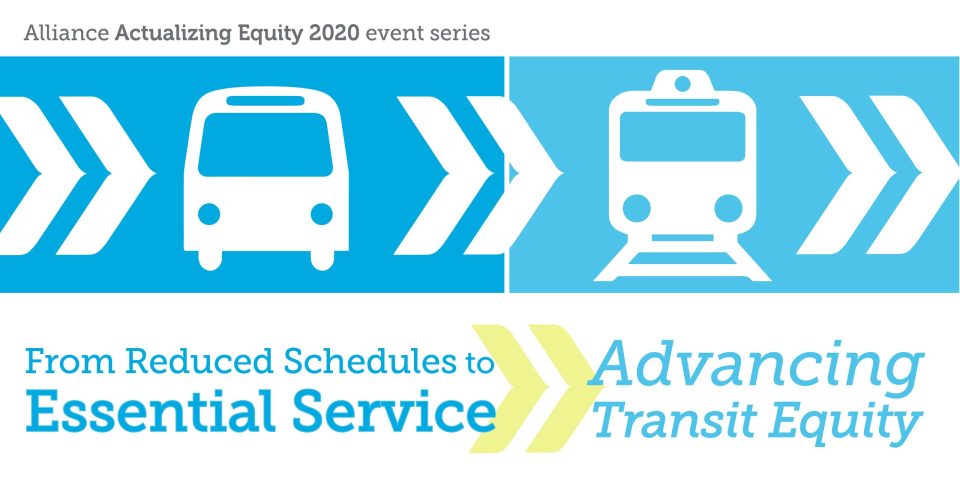
From Reduced Schedules to “Essential” Service: Advancing Transit Equity
Friday, April 24, 2020 | 11 a.m. to 1 p.m. | Virtual event
The COVID-19 pandemic has magnified and widened the deep and dangerous inequities in the systems that shape our everyday lives. While this moment has brought into the spotlight the vital role of “essential” workers — who are disproportionately low-wealth, immigrant and communities of color — it has also revealed the racialized gaps in the essential services those workers need to safeguard their health and meet their daily needs. In public transit, that dangerous disconnect has been clear, with deep cuts in service that support essential mobility for so many across the region and an alarming uptick in toxic narratives about the people who ride and the safety of public transit itself. How do we proactively combat the current and coming attacks on our already dramatically under-funded system while also boldly asserting the sweeping changes necessary to prioritize the needs of essential workers and communities of color not just now, but far beyond this current crisis.

The COVID-19 pandemic has elevated the undeniable connection between housing justice and community health. Building on the strong base of organizing in the Twin Cities, the current crisis has mobilized more renters and allies to demand that both short term relief and longer-term policy change center the needs and leadership of tenants and communities of color. How can we leverage this moment to build solidarity and move agendas that reject the notion that we can reform a fundamentally inequitable system that commodifies housing and instead re-imagine a policy ecosystem that is deeply rooted in tenant and community power and ownership? Join us for a conversation with organizers on the front lines of housing justice in the Twin Cities.

From Relief to Reconstruction: Advancing Equity in Small Business & Economic Development
The impacts of the COVID-19 pandemic and the uprising around the murder of George Floyd devastated many Black, brown, indigenous and immigrant-owned businesses in the Twin Cities. We know that these businesses play an essential role in building and sustaining the culture, wealth and economic vitality of BIPOC and immigrant communities, and funding from government, philanthropic and private sources are investing in our local “recovery” and “rebuilding.” In our June 2020 Actualizing Equity event, we explored: How do we ensure that short-term relief centers the needs of BIPOC- and immigrant-owned businesses and that new processes and policies around economic development advance the ownership and agency of our communities?

Last year, a group of leaders from the Minnesota’s Climate Equity Table came together for a BIPOC-led strategic planning process centered on “Whose voices, experiences and expertise are being centered in the current environmental landscape? And what are we willing to do about it?”
Join us for a conversation with local leaders who were part of that planning process and other environmental advocates, as we examine how environmental and climate justice narratives and agendas need to not just be influenced but truly led by BIPOC organizers who hold the insight and solutions that can bring real change.
Friday, September 18 | 11 a.m. to 12:30 pm | on Zoom
Our communities have been fighting an epidemic of evictions for years, but COVID-19 has created the conditions for a massive wave of unhoused residents in coming weeks and months. As camps continue to swell in city parks, new data suggests that Minnesota could see as many as 133,000 eviction filings over the next four months — 13 times the number we’d see in a typical year. According to a recent survey, more than 78% of Minnesota’s African American renters said they have no or only slight confidence that they’ll be able to pay their rent next month.
How are communities responding to protect their neighbors and what policy solutions can we advance to ensure that we not just survive but cure the injustice of evictions now and into the future?
Join us for a conversation with community and policy leaders working on this urgent issue in this critical moment!

Friday, October 23 | 11 a.m. to 12:30 pm | on Zoom
In 2020, the murder of George Floyd amplified to the national and international spotlight the generations’ long efforts of Black, Indigenous and People of Color (BIPOC) communities to seek justice for the devastating impacts of racist policing and envision new social systems to keep our communities safe, healthy and thriving. Thanks to fierce love and leadership, policy makers and the public are engaged in more robust conversations about how we spend and prioritize public dollars to protect prosperity and security for some while intentionally underinvesting in communities of color.
We know that safety and stability come, not from a reliance on policing and punishment, but from meeting fundamental human needs, like housing, jobs and healthcare.
As cities move toward adopting their 2021 budgets, join us for a conversation with community organizers from different issue areas who are elevating and advocating for the priorities that #FundOurLives.
Friday, December 11 | 11 a.m. to 12:30 pm | on Zoom
From housing to public health, community safety to democracy defense, 2020 was an intense and unrelenting year for organizing across every issue. Always leading with love and possibility, leaders of color across the Twin Cities secured critical wins that have dulled the harshest impacts of COVID and racism in our communities. But 2020 was much more than the sum of its parts. Together, we mobilized our communities across issues and identities to advance bold visions for the future, while embracing and visibilizing an ethic of self-care and healing to sustain ourselves and our movements into 2021 and beyond.
As this unprecedented and tumultuous year comes to a close, what strategies and practices are we carrying forward to ensure we never go back to a “normal” that isn’t liberatory for both ourselves and our communities?
Join us for an inspiring conversation with organizers from different issue areas!
Recap coming soon!
The 2019 Actualizing Equity series lifted up how communities and organizers are breaking out of issue silos and co-creating solutions that advance shared objectives and equitable outcomes. In collaboration with Alliance member organizations and other equity stakeholders, we shifted our focus from concepts to solutions, digging into how we can advance the strategies in Our AREA: The Alliance Regional Equity Agenda to create real change in our communities.

Igniting Renter Power for Environmental Justice (Feb 2019)
At the Alliance’s first Actualizing Equity 2019 event, Community Stabilization Project and Fresh Energy shared how their respective organizations are working together to bridge the gaps between tenants, landlords and clean energy policy advocates to advance housing affordability and climate justice through the St. Paul Tenant-Landlord Energy Project. Download the recap resource.

Leading with Equity — New Electeds of Color (March 2019)
People of color, indigenous, immigrant, and low-income communities have always been at the forefront of social change. But systems and institutions intentionally built on a foundation of racism, bias and injustice — designed to benefit white people at the expense of people of color — have excluded our voices and leadership at all levels of government. In recent election cycles in the Twin Cities, we’ve seen local organizing efforts and groundbreaking campaigns that have elevated leaders of color to local, county and regional policy making positions. At our March 2019 Actualizing Equity event, newly elected Richfield Mayor Maria Regan Gonzalez, Brooklyn Park City Councilmember Wynfred Russell and Hennepin County Commissioner Angela Conley joined us to discuss their impetus for running and approaches to policymaking. Download the recap resource.

Why Density Isn’t Enough (April 2019)
In neighborhood debates about new housing development, the simplified battle of the yard signs and bumper stickers boils down to NIMBYs and YIMBYs — Not In My Backyard and Yes In My Backyard. At that surface level, the dividing line is often density, with NIMBYs opposing increased traffic and building heights while YIMBYs preach the benefits of more concentrated housing supply. But that conversation often overlooks the deeper issues related to the role of the private market and the public good. At our April 2019 Actualizing Equity event, we explored the relationship of density to affordability and points of leverage to advance equity over purely private market solutions in housing development and land use decisions in our region. Download the recap resource.

Holding the Line: Equity in Transit Oriented Development (May 2018)
At our May 2019 Actualizing Equity event, we explored how organizers have mobilized — and are mobilizing — to integrate affordable housing, health, economic development and other equity issues into the visions and implementation of coming transit investments. We heard from Denise Butler, Program Manager for African Career, Education and Resource Inc; Nestor Garcia, Community Outreach Director for the Harrison Neighborhood Association; and Kenya McKnight, Founder and President of the Black Women’s Wealth Initiative — with facilitation from Avi Viswanathan, Program Director for the Nexus Community Engagement Institute at Nexus Community Partners. Download the recap resource.

Home Field Advantage: Securing Strong Community Benefits (June 2019)
From community benefits to co-creation, local organizing is beginning to shift the calculations around large-scale developments, pressing government officials and private developers to consider and address the potential impacts of their investments on local residents and businesses. In St. Paul, the construction of Allianz Field has raised concerns about the impact of the soccer stadium on affordable housing, small businesses and the communities of color that have long called the area home. At our June 2019 Actualizing Equity event, Tia Williams and Caty Royce, Co-Directors of Frogtown Neighborhood Association; Mitra Jalali Nelson, St Paul City Councilmember for Ward 4; MaiChong Xiong, Legislative Aide to Ward 1 Councilmember Dai Thao and engaged community members discussed challenges and opportunities to create and implement effective community benefit agreements for large-scale developments. Download the recap resource.

Sustaining Equity: Going Green Without Gentrification (July 2019)
Parks, green infrastructure and sustainable development bring a range of social, cultural, health and environmental benefits. But too often the public, private and non-profit sectors do not appropriately address the ‘unintended consequences’ of these improvements. How do we ensure that communities most impacted by environmental harms historically reap the benefits of new and ongoing investments? Where do we have leverage to engage community and embed their priorities in conversations about green development, and where are leaders in different types of organizations seeing success? At our July 2019 Actualizing Equity event, we discussed these issues with Sam Grant from the Public Policy Project / Environmental Justice Coordinating Council; Shruthi Kamisetty from Parks & Power; Seema Kairam from the Trust for Public Land; Mira Kleinfrom the CREATE Initiative; and Stephen Klimek from the Towerside Innovation District. Download the recap resource

Creating our Vision for Equitable Housing (Sept 2019)
Renters now make up the majority of residents in Minneapolis, St. Paul and many other communities across the Twin Cities metro — and tenant organizing is building momentum to reframe how we approach housing justice. For years, “affordable housing” has been at the forefront of many advocacy efforts, with a focus on ensuring the cost of rent is within reach for historically marginalized, low-wealth households. But we know real housing equity goes far beyond affordability, encompassing tenant screening, unit size, cultural practices and so much more. Our September 2019 Actualizing Equity event included a panel discussion and collaborative visioning session to continue the leadership of Community Stabilization Project and set a new trajectory for equitable, not just affordable, housing. Download the recap resource

A Seat at Whose Table? Actualizing Equity in Advisory Committees (Oct 2019)
Centering the expertise and lived experiences of those most impacted is fundamental to actualizing equity around any issue. Thanks to generations of tenacious leaders, institutions and government bodies are increasingly integrating community members in more advisory committees around policy and decision-making. Still situated in structures built by and for white supremacy, how can community leverage these openings to build power and reorient priorities, rather than extract uncompensated intellectual and emotional labor in service of incremental change? At our October 2019 Actualizing Equity event, Chai Lee, Metropolitan Council Member and Program Manager for the Boards and Commissions Leadership Institute at Nexus Community Partners; Ashwat Narayanan, Executive Director at Our Streets Minneapolis; and Tia Williams, Co-director at the Frogtown Neighborhood Association shared their experiences and strategies to participate in and change these processes to instigate real and lasting value for our communities. Download the recap resource
The 2018 Actualizing Equity Series dove into each section of Our AREA: The Alliance Regional Equity Agenda. Each session included a panel of local leaders who explored the ways each issue area intersects with the complex identities and historical struggles of our communities and breakout discussions for participants to share their ideas and insights. From these conversations, we created the resources below!

Navigating the Intersections: How We Experience Mobility (May 2018)
Communities encounter different risks and have different needs as they move through the metro region. At this event, we heard from local leaders who experience transportation in a variety of ways and participate in breakout discussions to share your own stories and strategies for getting around our region while facing racism, classism, ableism, sexism, ICE, xenophobia, homophobia, and other forces of oppression. Navigating the Intersections Resources

Housing Is A Human Right (June 2018)
Where we live impacts every aspect of our lives – it affects how we thrive in our community and provides the foundation for our health, education, safety, and economic wellbeing. At this event, we explored how that right is denied and disregarded in the face of gendered violence, racism, the (in)justice system, anti-immigrant discrimination, and other forms of oppression. Housing Is A Human Right Resources

Who Speaks for the Neighborhood? (July 2018)
True community engagement requires organizations to dedicate time, energy, and resources to building meaningful and mutually beneficial relationships. At this event, we discussed how folks are challenging systems that reinforce the status quo and creating accessible spaces, projects, and processes that allow community members to feel welcomed as their full selves. Who Speaks for the Neighborhood Resources

The Geography of Wellness (Aug 2018)
Wellness is not evenly distributed. Invisiblized policies and practices determine which neighborhoods are home to pollution and which are environmentally and economically healthy. At this event, we discussed these historical harms and share our vision of equitable land use policies that enrich neighborhoods, connecting residents to a broad set of choices. Geography of Wellness Resources
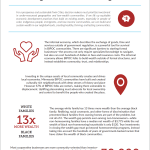
Building Wealth, Building Power (Sept 2018)
For a prosperous and sustainable Twin Cities, decision makers must prioritize investment in under-resourced geographies and low-wealth communities. At this event, we discussed how we can lift up equitable economic development practices that build on existing assets and allow people of color, indigenous people, immigrants, and low-income communities to build and sustain wealth in their neighborhoods creating healthy, thriving communities. Building Wealth, Building Power Resources

Race, Class, and the Outdoors (Oct 2018)
Due to under-resourced infrastructure and limited choices in where to live, work, and play, people of color, indigenous people, immigrants, and low-income communities are disproportionately barred from accessing natural amenities. At this event, we discussed how folks are reimagining our relationships with our environment, and organizing to improve parks in communities of color without gentrifying them. Race, Class, and the Outdoors Resources
See resources from previous years on our Event Resources page.


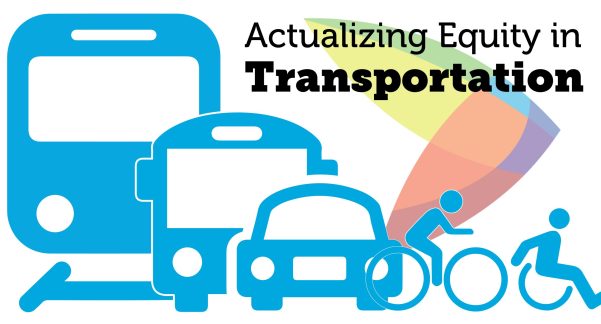


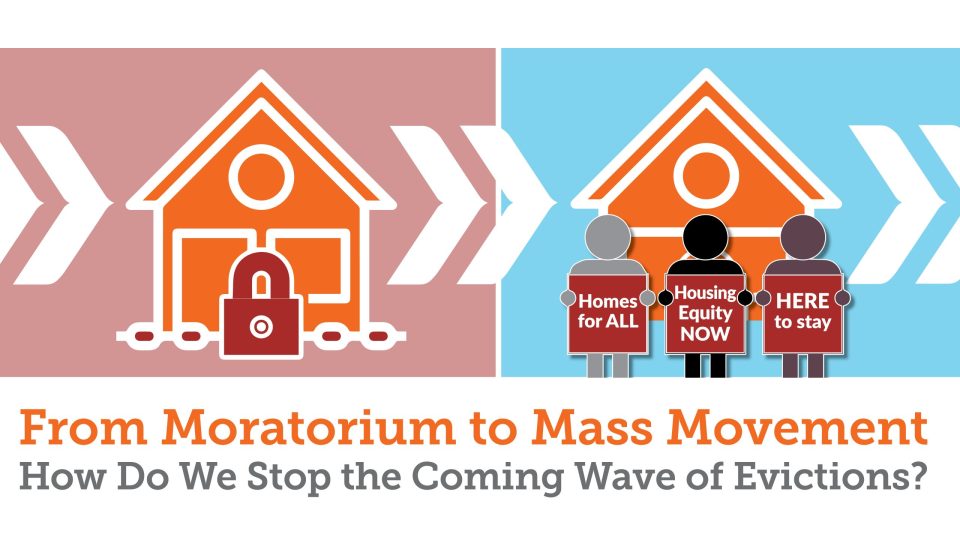
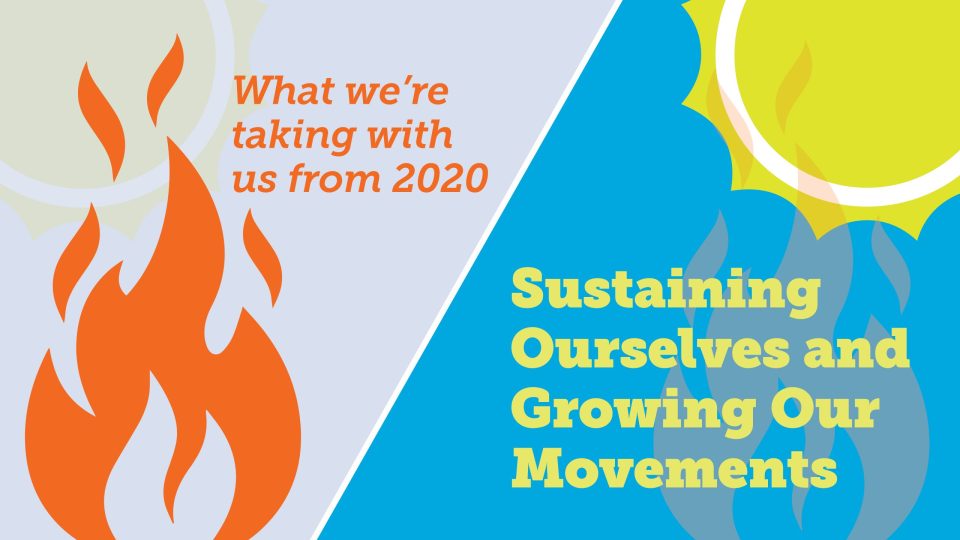
You must be logged in to post a comment.